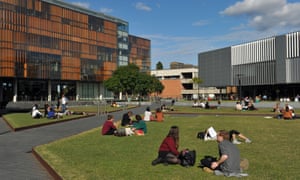Centre Alliance’s Rebekha Sharkie has ‘serious concerns with arts students being slugged $30,000 for a degree’
Dan Tehan has added sweeteners to boost regional and Indigenous participation in a major overhaul of universities’ funding
but the package – which doubles the cost of arts degrees to pay for
more places and other course discounts – has been criticised by Centre
Alliance’s Rebekha Sharkie.
Sharkie, whose party holds two Senate seats which will likely be crucial to passing the package, told Guardian Australia she has “serious concerns” with the 113% price rise for humanities courses other than English and languages, and believed it “grossly unfair” to late high school students who formed preferences before the 2021 fee changes.
She was speaking after the education minister told the national press
club in Canberra there was no additional money in the package beyond
indexed growth, with new initiatives such as the “industry linkage fund”
to be paid for by $900m of cuts in teaching and learning budgets.Sharkie, whose party holds two Senate seats which will likely be crucial to passing the package, told Guardian Australia she has “serious concerns” with the 113% price rise for humanities courses other than English and languages, and believed it “grossly unfair” to late high school students who formed preferences before the 2021 fee changes.
The package promises an extra 39,000 university places by 2023, with price increases in humanities (113%), law and commerce (both up 28%) to pay for more places and discounts in in-demand courses such as teaching, nursing, maths, science and engineering.
Tehan said he would consult the Senate crossbench to win support but hoped they “will understand that this is going to be … really important for how we … deal with the coronavirus pandemic and growing our economy”.
Sharkie, Centre Alliance’s education spokeswoman, would “need to have a good look” at the package but has “some serious concerns with arts students being slugged $30,000 for a degree”.
Students could pay as much as $43,500 for a humanities degree, up from $20,400.
“We need philosophers, we need political scientists, we need sociologists,” Sharkie said. “I think it’s really shortsighted if … what we are going to see as a result is whole faculties gutted.”
Sharkie acknowledged Tehan’s work boosting university places but said the government should not be “picking winners and losers” by increasing some course costs by more than 100%.
“I don’t think we should be making humanities courses the enemy,” she said.
Earlier Tehan played down the prospect students could be priced out of some degreessaying “no student pays a single dollar upfront” if they take out a Help loan and start repaying the government when they earn more than $46,000.
Tehan countered the suggestion the package amounted to making arts students pay for others’ courses: “I could say that what it’s been happening up until now is … engineers and scientists have been subsidising arts graduates.”
Tehan revealed further measures including:
- $900m for an “industry linkage fund” for investment in science, technology, engineering and maths education
- $500m to support Indigenous, regional and low socioeconomic students attending university
- New $5,000 grants to students from outer regional and remote areas to help pay relocation costs
- A $50m research fund for regional universities and industry partners
The regional measures would be paid for by growth in the existing higher education participation and partnerships program.
The policy effectively reduces the overall government contribution to degrees from 58% to 52%, with student contributions lifting from 42% to 48% to pay for more places without extra government funding.
The courses that would suffer the biggest declines in government contributions are communications (-$12,447 a student a year), society and culture (-$9,915), environmental studies and medical science (-$7,946), and humanities (-$5,216).
The government will tip more into courses in English ($7,274 a student a year); languages ($2,953); agriculture, dental, medicine and veterinary science ($2,554); architecture, IT, maths and health ($2,485).
Labor’s education spokeswoman, Tanya Plibersek, said although more university places was “a good thing”, the government “wants students to foot the bill”.
“A couple of years ago, Scott Morrison cut uni places,” she said. “Now he expects people to be grateful he’s reversed some of those cuts.
“Even after today’s announcement, thousands of Australians will still miss out on uni.”
The Group of Eight universities’ chief executive, Vicki Thomson, said it “disagrees strongly with the idea implicit in the changes for law, economics, business and particularly the humanities that these students should miss out on government support and should have to pay over 90% of the cost of their degrees”.
“But we recognise that out of Covid has come the need to embrace a level of pragmatism for the long-term national good. This is one such moment in time.”
The Australian Technology Network’s chair, Attila Brungs, said it welcomed that the government would remain the “majority funder of the cost of Australian student places at university and ensuring no increased cost for students already studying”.
But Brungs warned ATN would need to “through this package in detail to understand and analyse the future impact on students as well as our capacity to deliver high quality engineering and science programs”.
Group of Eight interim chair, Margaret Gardner, told ABC TV the package actually decreased both the government contribution and student fees for engineering and science.
The Regional Universities Network’s chair, Helen Bartlett, said it was “delighted” by new measures to boost regional participation and research capacity.
Cathy Coleborne, the secretary of the Australasian Council of Deans of Arts, Social Sciences and Humanities, said she had “concerns” the package sent “confusing and mixed signals about the relative value of some disciplines … that some degrees are more valuable than others”.
Coleborne said the study of humanities had both an “intrinsic value” and current job outcome surveys might understate that “the jobs of the future need thinking, creativity, and writing” taught in such degrees.

No comments:
Post a Comment